JENNIFER CORDING, DELMARVA MEDIA GROUP CORRESPONDENT 11:44 a.m. EST November 17, 2014
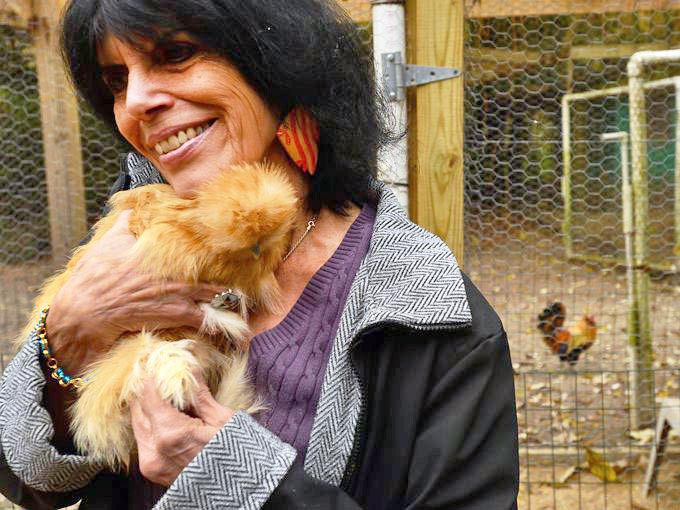
Karen Davis, president of United Poultry Concerns, holds Miss Chard, one of more than 100 rescued domestic fowl at her Machipongo home, which also serves as the non-profit's farm fowl sanctuary.
Staff photo by Jay Diem
|
Priscilla was angry and moody. Mila was gentle and sweet.
The pair looked just alike, but their personalities were quite different, says Karen Davis, who cared for them.
When Priscilla got mad, she'd get red and purple in the face. Only Mila could calm her. In fact, when Priscilla paced the fence, ready to fly into a rage,
Mila rushed to settle her.
Mila would place her body between Priscilla and the object of her wrath. And Priscilla would calm down, just that fast. It happened often, Davis says.
Of course, moody Priscilla and sweet Mila were turkeys. They lived on a farm where Davis worked a while back. They were production-farm turkeys, says Davis
— bred for their meat, not longevity — so they lived a few years, and then they died a natural death.
"It reminds me every day of why I'm doing what I'm doing," Davis says of the relationship between Priscilla and Mila, turkeys who evaded serving as a main
meal when their slaughter-bound truck wrecked on the way to a processing plant.
With Thanksgiving next week, turkeys are on Davis' mind. Actually, they're always on her mind, along with chickens, peafowl, guineas and birds of every
type.
It's why Davis spends each day educating people about them. It's why she and others will be in Washington D.C. on Sunday passing out leaflets about why
"Turkeys are Too Neat to Eat."
According to Davis, Priscilla and Mila were a classic case of poultry displaying distinct personalities and even empathy — not traits typically associated with turkeys, or any fowl, she says.
|
STORY HIGHLIGHTS
Karen Davis, who has a Ph.D. in English, runs a poultry preserve in Northampton County.
She says poultry birds have distinct personalities and display empathy.
"There's nothing like knowing the birds in a personal way," she said.
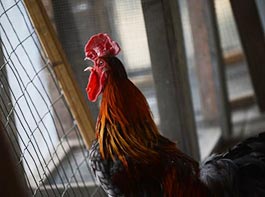
View the slideshow
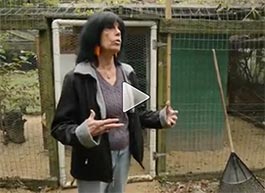
View the video
See also: Turkey Alternatives
|
It's why Davis' poultry sanctuary, United Poultry Concerns, in Northampton County, took flight. She believed chickens, turkeys, peafowl, guineas and other
birds were getting a bum rap. Calling someone bird-brained, after all, is not a compliment.
And, Davis says, it's name-calling that demeans fowl so people don't think twice about how they are treated.

Karen Davis, president of United Poultry Concerns, sits at her office computer
at her Machipongo home,
which also serves as the non-profit's farm fowl sanctuary.
(Photo: Staff photo by Jay Diem)
Bold operation
She decided to give a home to refugee fowl. It was bold to move the operation to the Eastern Shore. In Accomack County alone, there were 6.7 million
chickens grown agriculturally, according to a 2012 U.S. Department of Agriculture census.
Driving up the dirt lane to Davis' Eastern Shore-style white farmhouse, it soon is obvious there's something a bit different about this country homestead.
Attached to the traditional-looking farmhouse is a large wire compound. The structure encloses trees, numerous buildings — and of course, a lot of
chickens.
Davis emerges from the house. She's a petite woman, with a quick and friendly manner. She's across the yard and introducing herself before a reporter can
gather a notebook.
This is not a woman used to dealing only with chickens. At one point, she jokingly refers to herself as "that crazy chicken lady." But it's clear she's as
sharp as a spur on one of the roosters she's worked to save.
In fact, Davis holds a Ph.D. in English from the University of Maryland-College Park, where she taught for twelve years in the English department. Her
professional and activism biography is far too lengthy to list, but it includes numerous books, professional articles, essays and op-eds in many major
newspapers and magazines.
A feature on Davis in The Washington Post won a major journalism award. Her invitation to a National Public Radio host to visit United Poultry Concerns,
then in Maryland, resulted in his televised admission on the The Late Show with David Letterman that he became a vegetarian because of Davis and meeting
her chickens
"There's nothing like knowing the birds in a personal way," says Davis of such encounters. "It gives you a credibility when talking to people about these
animals."
Davis does not remember a time when she didn't feel a kinship with birds, even as a child growing up in Altoona, Pa.
Somehow, birds reminded her of angels, she says.
"There was something about their faces, feathers and wings," says Davis. "I can't even explain it."

Chickens roam the outdoor sanctuary at United Poultry Concerns in Machipongo, Va. on Wednesday, Nov. 12, 2014.
The sanctuary currently houses over 100 rescued domestic fowl.
Staff photo by Jay Diem
From one chicken
There was one chicken that started it all. Her name was Viva. It was 1985.
By then, Davis was married. Already she had moved across the country to San Francisco and back again.
She and her husband were living in semi-rural Maryland. One day, through the trees at the back of their property, Davis noticed a commercial chicken house
on the next property.
She peeked inside. She knew little about chickens then. She was a typical suburbanite, she says.
Davis visited the chickens nearly every day, peeking through the windows of the chicken house.
One day, in the late summer, the chickens were gone — almost all of them anyway. When Davis looked inside, she saw something move. It was a chicken.
A lone hen had been left behind. It had trouble walking, she says, but it still was looking for food and water in the deserted chicken house.
Davis took the chicken home and named her Viva. The hen lived in Davis' yard by day, with a bed by the stove at night.
Over the next three months, Viva's body failed her — her legs were not able to support her body. It's a common occurrence, says Davis, in chickens
that are bred to mature quickly for their meat.
A veterinarian euthanized Viva. The vet thanked Davis for caring about a chicken. Most people wouldn't have cared, the vet said.
By 1990, Davis had founded United Poultry Concerns, later moving the operation to the Eastern Shore.
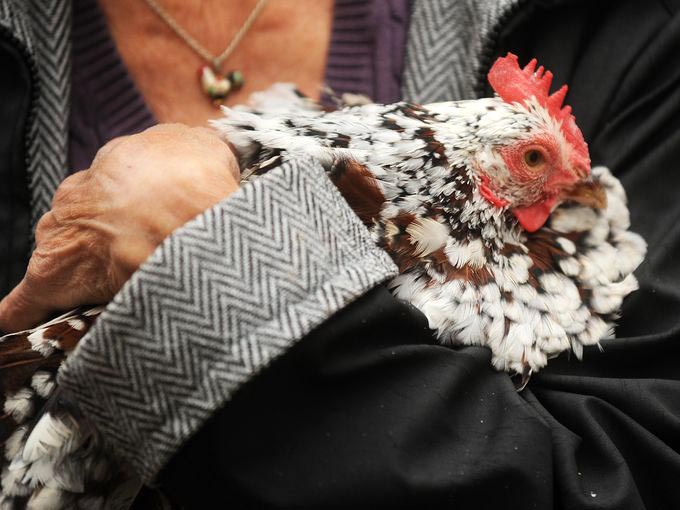
Karen Davis, president of United Poultry Concerns, holds Miss Princess,
one of more than 100 rescued domestic fowl at her Machipongo home,
which also serves as the non-profit's farm fowl sanctuary. Staff photo by Jay Diem
Each bird named
Davis has a remarkable memory. Each of the 112 birds at her sanctuary has a name, and she can tell you the date and circumstances under which it arrived.
There's Natalia and Natasha, who are elderly and among several birds who live on the enclosed porch with blankets at night. Belinda, Buffy and Amber are
called by name.
Desiree is a game hen from Alabama. She's the longest-term resident at the Machipongo farm, arriving about 2000. She's practically blind, now. But she
trusts Davis, and she rests contentedly in her arms.
Lorenzo is from North Carolina. Mr. Sippy, a "cheerful" blue-and-red rooster, is from Mississippi. Makenzie arrived partially de-beaked with his comb cut
off — not uncommon for roosters, says Davis.
Makenzie was "very scared and timid," says Davis. "He was very traumatized."
It took a long time, but Makenzie finally came out of his shell. He has lived in the sanctuary for six years now.
There's the peacock named Frankincense, who wandered up one day. Davis' sanctuary assistant, Wayne Wills, also a local building contractor, helped lure
Frankincense inside the house with peanuts after the peacock persisted in watching Davis through a window in her office. Now, the bird is inside the
protected enclosure, too.
Davis admits that some flocks arrived looking so much alike they must share a name. Each hen in one group of white chickens is Sentimental Sweetie, for
example. Another group of 50 hens from California are Earth Angels. The birds don't seem to mind.
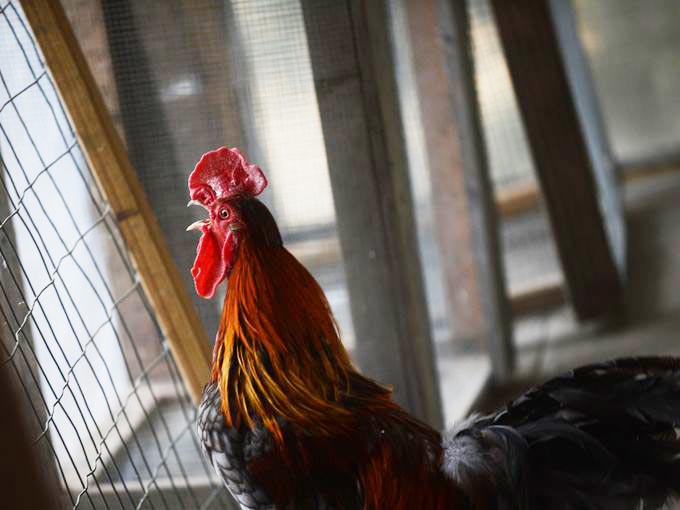
A rooster crows on the porch at United Poultry Concerns in Machipongo, Va. on Wednesday, Nov. 12, 2104.
Several elderly chickens share a space on the back porch.
The sanctuary currently houses over 100 rescued domestic fowl.
Staff photo by Jay Diem
War worth fighting
Not every bird is a sentimental sweetie, however. In fact, there's one rooster, Bisquet, who seems to hold a grudge against Davis, though she has given him
refuge in a world that can be bleak for a chicken.
It's a competitive thing, she thinks. She's the boss, and he wants to be in charge. Bisquet has gotten, well, a bit cocky. Davis holds a rake in defense
when he's out of his pen, just in case.
But, fighting off a rooster with a rake — it's a small battle compared to the war she's been fighting.
And Davis knows it's not a war she's winning. Housing 112 chickens isn't a dent in the millions of chickens raised on the Shore alone for slaughter each
year.
But that won't stop Davis and her fight.
She is 70 now, though she looks and moves as if years younger.
The fight is what keeps her going, she says.
"To get bad news all day, every day — it reminds me every day of why I'm doing what I'm doing," says Karen Davis. "I really put chickens on the
animal-rights map."
It's a war worth fighting, and a legacy worth leaving behind, she believes.
And Thanksgiving is a season that doesn't need a turkey – or any bird – to celebrate, she says.
"Thanksgiving is about giving thanks," she says. When fowl aren't part of the festivities, "then, we can truly give thanks."
"Win or lose, this is what I do," she says.
***

Bisquet, a rescued rooster, roams the outdoor sanctuary
at United Poultry Concerns in Machipongo, Va. on Wednesday, Nov. 12, 2014.
The sanctuary currently houses over 100 rescued domestic fowl. Staff photo by Jay Diem
Open house Saturday
United Poultry Concerns will host a Thanksgiving Open House on Saturday, Nov. 29 from 2 to 5 p.m. The public is invited to attend at no charge.
President Karen Davis asks attendees to bring one all-vegan dish – enough to share with four people – that is free of meat, dairy and eggs.
Pasta and salad will be provided by Little Italy in Nassawaddox. Attendees will meet United Poultry Concerns' "happy chickens, guinea fowl and peacock and
visit (the) beautiful new outdoor aviary on the Eastern Shore of Virginia."
For directions, visit the group's Website: www.upc-online.org/upc_directions.html.
For more information, call Davis at 678-7875 or e-mail her karen@upc-online.org.
No Thanksgiving turkey?
Karen Davis suggests getting "out of the turkey rut" for Thanksgiving. It's a challenge for people who like to cook, and she says, a delicious meal does
not have to include a main course of meat.
In fact, Davis has published a book, "Instead of Chicken, Instead of Turkey: A Poultryless 'Poultry' Potpourri," which features homestyle, ethnic and
exotic alternatives to traditional poultry and egg recipes.
The book, as well as a sampling of non-poultry recipes is available free at the United Poultry Concerns website at: www.upc-online.org/recipes.
This article appears on www.DelmarvaNow.com, the front page
of the Salisbury (MD) Daily Times, the Eastern Shore News and USA Today!